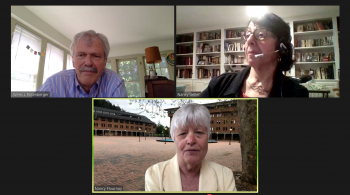

To honor the work and actions of the late Ingram Olkin, an eminent statistician, mentor and contributor to social causes, NISS brings together experts and researchers together from a variety of fields and backgrounds into multi-day forums.
The focus of these forums is to bring forward a current societal issue that might benefit from attention from the statistical community and others. (See introductory remarks by Nancy Flournoy for details on the objectives of this Forum series on Unplanned Disruptions of Clinical Trials, together with some operational details.)
Do Clinical Trials Face Irreversible Losses?
Since March, 2020 unplanned changes to daily routines due to the mandatory isolation and social distancing requirements during the COVID-19 pandemic have occurred across the globe. These disruptions have wreaked havoc on clinical trials in progress as well as those in the planning stages.
What are the implications of these disruptions? What strategies can be put into place to mitigate those data that have already or will not be collected? Are there changes to methods or plans that researchers can put into place moving forward?
Day One: NIH Perspectives
To start off this series of forums, Day One involved gathering the perspectives from prominent statistical leaders in government agencies. Three senior and experienced researchers provided their thoughts and shared examples from their own institutions in the National Institutes of Health. Over 140 were in attendance to hear what they had to say.
Nancy L. Geller is the Director of the Office of Biostatistics Research at the National Heart, Lung, and Blood Institute (NHLBI) was the first speaker. Nancy directed attention to identifying a number of important factors including when the disruption occurred, how far along was accrual, the nature of the intervention, and how to modify the data collection and analysis. From here she provided two examples of NHLBI trials that have been disrupted. First, the PLAN with Families trial (Primary care pediatrics Learning Activity Nutrition) involving a diet and exercise intervention for overweight children and one overweight parent and a second more complex example involving hematopoietic stem cell transplantation.
Nancy was followed by Dean Follmann who is Chief at the Biostatistics Research Branch at the National Institute of Allergy and Infectious Diseases. Dean shared two examples as well. The first example involved the use of monoclonal antibodies as a seasonal protection against children getting malaria and how this trial was adapted to deal with disruptions in administration and data collection. The second example involved a blinded randomized trial of 3,200 women at risk of HIV infection and the strategies that were put into place to deal with the problems that resulted because of the inability to intervene or follow up with subjects. He also discussed how permutation methods could protect the type I error rate for unplanned adaptations conducted before breaking the blind.
The final speaker of Day One was Lisa McShane, an Associate Director at the Division of Cancer Treatment & Diagnosis and Chief at the Biometric Research Program at the National Cancer Institute. She discussed four major topics: the immediate consequences of disruptions, modifications to trial procedures, the impact on study design and feasibility and lastly, the leveraging of expertise, trial resources and infrastructure to provide insight. Nimble is one of the words that Lisa used to describe how researchers need to think and react given the complications that have presented themselves.
Nancy Flournoy, Chair of the NISS Ingram Olkin Forum Committee, Founding member of NISS and Distinguished Professor Emeritus at the University of Missouri, and James Rosenberger, Director, NISS, served as moderators for this session.
Be Involved in What Follows!
Please Note: You are automatically registered for Day Two if you attended Day One. It is the same link and this second forum session will take place on Tuesday, July 28, 2020 at 10 am. If you have not registered, do so now!
Day Two will feature perspectives from the Centers for Disease Control and Prevention, the U.S. Food and Drug Administration, and the European Medicines Agency. Speakers include Lilly Yue, Deputy Director, Division of Biostatistics at the FDA, G. David Williamson, Director, Office of Science, National Center for Environmental Health, CDC and Aldana Rosso, EMA.
Following Day Two a survey will be sent out soliciting interest for active participants in methodolgy working sessions (Days 3-6) where attendees are encouraged to request a role such as discussant, moderator, recorder or note taker. After invited talks on topics to include estimand issues, missing values, group sequential designs and sample size re-estimation, participants will be assigned to small discussion groups in breakout rooms, regrouping for reporting, syntheses, and writing on the topic.
Recording of the Session
Slides Used by the Speakers
Nancy Flournoy, NISS, University of Missouri
Introductory Comments: "Unplanned Disruptions in Clinical Trials: An Ingram Olkin Forum Series"
Nancy L. Geller, NHLBI
Dean Follmann, NIAID
Lisa McShane, NCI
“Clinical Trial Disruptions Due to COVID-19: An NCI perspective”
